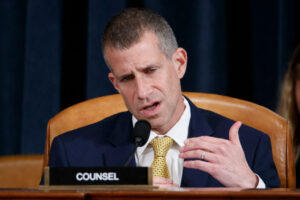(Image via Getty)
It’s about that time of the year. No, not the holidays. It’s the time when some of us start to panic trying to cram in our CLE credits before the calendar year is over. Also, why are ethics courses always the most boring CLE credits to earn? In any event, while you are thinking deep thoughts about ethics, or merely trying to stay awake for the sake of maintaining your law license, consider adding to your ethics reading list this thought-provoking article on Surrogacy Professionalism by assisted reproductive technology law attorney Christina Miller and ethics professor June Carbone. The article is a must-read for any attorney starting out in the surrogacy field, facing a rocky road paved with ethical dilemmas. Maybe your state will even give you some self-study CLE credit.
Taming The Wild West … Through Lawyers
Surrogacy Professionalism characterizes American surrogacy law — often described as “ART” law even though there are no paintings — as “confusing, inconsistent, evolving, and difficult to categorize.” As you know from reading this column loyally, that’s not wrong. The article takes a hard look at the different ways jurisdictions have attempted to regulate the practice of surrogacy within their borders — banning or even criminalizing the practice, accepting the practice and setting guidelines and standards, or doing nothing (a popular choice!).
Miller and Carbone argue that all of these methods have their flaws. Even the most well-thought-out state regulation suffers from the pervasive defect that people and entities can travel beyond the regulations’ reach by merely crossing into other jurisdictions with friendlier legal environments. “It cannot be overstated how much uncertainty there is in the practice of ART law. Even if a surrogacy arrangement takes place in a jurisdiction like California that has clear law on the subject, the intended parents cannot rule out the possibility that a gestational carrier will flee to another jurisdiction, such as Michigan, where she will be the legal parent.”
The authors argue that a more effective route than creating laws on surrogacy arrangements themselves is to regulate the attorneys who practice in the area.
If There Isn’t Law, Why Do We Need Attorneys?
Miller and Carbone argue that, given the contractual emphasis prior to an attempted pregnancy in a surrogacy arrangement, the attorneys drafting and advising the participants are key players to mitigating future conflicts. They also contend that a number of standard surrogacy contract provisions might be unenforceable. These include abstaining from eating sushi or deli meats, or avoidance of microwaves. Or, more seriously, the common provision that a surrogate agrees to terminate, or not to terminate, a pregnancy in accordance with the intended parents’ wishes.
In the infamous Melissa Cook case, written about here previously, the gestational surrogate claimed that she never read the 75-page contract that she signed, and did not know that she had agreed to aborting part of her pregnancy from triplets to twins, or even a singleton if asked of her by the intended parent. When it was requested, her refusal sparked a long and arduous legal battle, ending with all three babies being born, but with her application for parental rights being denied. The case went all the way to the Supreme Court before a denial of certiorari ended the matter.
In Surrogacy Professionalism, the authors argue that the importance of such a key provision for one party normally would have led skilled attorneys to question whether Melissa Cook really wanted to be a surrogate for the intended parent in this case. Even if they parties ultimately wanted to proceed, perhaps they might have chosen to only transfer one embryo at a time, instead of the three that resulted in triplets.
Certification Time?
Surrogacy Professionalism argues that there is “a clear need for a surrogacy practice group to develop a specialty certification program that could be accredited by the American Bar Association, and whose members agree to abide by the ABA’s ethical guidelines.” The authors point to California’s specialty certification in family law. This doesn’t mean that you can’t practice without certification, but the certification would arguably give an attorney extra credibility in the marketplace. Only after practicing in the area for five years, spending 25 percent of professional time focused on the area, and passing a written exam, can a California attorney be certified as a family law specialist. A similar state-specific or national program could at least give consumers confidence in choosing an attorney with substantial experience in the area, although objectors will point toward further “cartelization” of the legal practice.
Conflicts Everywhere
The authors also explore the daily conflicts faced by surrogacy attorneys. For one, the legal fees of the attorney representing the surrogate are inevitably always paid by the intended parents (aka, the opposing party). This, of course, could possibly make the attorney more inclined to give in or appease the opposing party (the source of their fees), instead of zealously advocating for their client. In another regularly occurring conflict, most surrogacy attorneys receive many of their referrals from matching organizations. While it might not be in the client’s interest to go forward with the match, a broken match could mean a reduced or dried up referral source for the attorney as a result.
The conflicts take on another dimension when the matching entity and the representing attorney have intertwined interests. But the authors come out as “agnostic” as to whether such a conflict is permissible and reasonably overcome with disclosure, exploring both the pros and cons of the interconnected professional roles.
These are merely a few of the conflicts discussed that a surrogacy attorney will inevitably encounter. While I may not be eager to see more attorney regulation (it’s hard enough to keep up with all the CLEs!), Miller and Carbone pose some fascinating questions in their focus on the ethical issues regularly faced by surrogacy attorneys, and suggest reasoned proposals for improving the field. Definitely worth a read, especially if you are new to the area or considering bravely venturing into the surrogacy field.
 Ellen Trachman is the Managing Attorney of Trachman Law Center, LLC, a Denver-based law firm specializing in assisted reproductive technology law, and co-host of the podcast I Want To Put A Baby In You. You can reach her at babies@abovethelaw.com.
Ellen Trachman is the Managing Attorney of Trachman Law Center, LLC, a Denver-based law firm specializing in assisted reproductive technology law, and co-host of the podcast I Want To Put A Baby In You. You can reach her at babies@abovethelaw.com.



















 Kathryn Rubino is a Senior Editor at Above the Law, and host of
Kathryn Rubino is a Senior Editor at Above the Law, and host of 